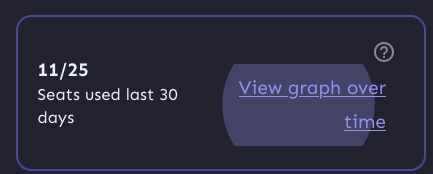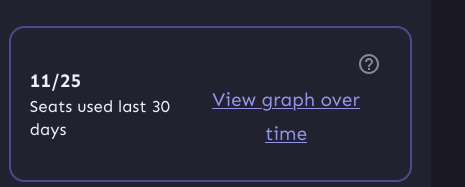<!-- Thanks for creating a PR! To make it easier for reviewers and
everyone else to understand what your changes relate to, please add some
relevant content to the headings below. Feel free to ignore or delete
sections that you don't think are relevant. Thank you! ❤️ -->
## About the changes
<!-- Describe the changes introduced. What are they and why are they
being introduced? Feel free to also add screenshots or steps to view the
changes if they're visual. -->
### Summary
- Add `PROJECT_ARCHIVED` event on `EVENT_MAP` to use
- Add a test case for `PROJECT_ARCHIVED` event formatting
- Add `PROJECT_ARCHIVED` event when users choose which events they send
to Slack
- Fix Slack integration document by adding `PROJECT_ARCHIVED`
### Example
The example message looks like the image below. I covered my email with
a black rectangle to protect my privacy 😄
The link refers `/projects-archive` to see archived projects.
<img width="529" alt="Slack message example"
src="https://github.com/user-attachments/assets/938c639f-f04a-49af-9b4a-4632cdea9ca7">
## Discussion points
<!-- Anything about the PR you'd like to discuss before it gets merged?
Got any questions or doubts? -->
I considered the reason why Unleash didn't implement to send
`PROJECT_ARCHIVED` message to Slack integration.
One thing I assumed that it is impossible to create a new project with
open source codes, which means it is only enabled in the enterprise
plan. However,
[document](https://docs.getunleash.io/reference/integrations/slack-app#events)
explains that users can send `PROJECT_CREATED` and `PROJECT_DELETED`
events to Slack, which are also available only in the enterprise plan,
hence it means we need to embrace all worthwhile events.
I think it is reasonable to add `PROJECT_ARCHIVED` event to Slack
integration because users, especially operators, need to track them
through Slack by separating steps, `_CREATED`, `_ARCHIVED`, and
`_DELETED`.
This change updates the stat for archived flags "this month".
Turns out we were accessing the wrong property on the data object.
Additionally, changes the label to say "last 30 days" instead of "this
month" because that's more accurate.
We want to prevent our users from defining multiple templates with the
same name. So this adds a unique index on the name column when
discriminator is template.
This PR fixes the isOss check for the licensed users component. It also
addresses two things in the UI:
1. It right-aligns the text on the button so that when we get narrower,
the text doesn't slide to the center. There's a few more things that we
can fix later, though. When you press it, it'll still show the entire
button layout:

And when you focus it with a keyboard it still looks like a button.
We can get around that by using a regular button and just styling it a
bit, but making the text align will take some extra jimmying around (not
done in this pr, but got stashed changes for it)

But this is what it'd look like now with centered text:

2. It wraps the entire left column in a `p` tag, because they belong
together. They're not two logical paragraphs. So instead, we wrap them
in spans and surround them in a
p. `Display: contents` makes the p "invisible", so its children act as
if
they're children of the container above it instead.
This PR improves handling of very narrow screens for the project status
header:
- Add a right margin so that it won't overlap with the close button.
- Make it so the icon in the header doesn't shrink.
This PR fixes three things that were wrong with the lifecycle summary
count query:
1. When counting the number of flags in each stage, it does not take
into account whether a flag has moved out of that stage. So if you have
a flag that's gone through initial -> pre-live -> live, it'll be counted
for each one of those steps, not just the last one.
2. Some flags that have been archived don't have the corresponding
archived state row in the db. This causes them to count towards their
other recorded lifecycle stages, even when they shouldn't. This is
related to the previous one, but slightly different. Cross-reference the
features table's archived_at to make sure it hasn't been archived
3. The archived number should probably be all flags ever archived in the
project, regardless of whether they were archived before or after
feature lifecycles. So we should check the feature table's archived_at
flag for the count there instead
https://linear.app/unleash/issue/2-2989/unleash-payg-auto-traffic-billing
Integrates auto traffic bundle billing with PAYG.
Currently assumes the PAYG traffic bundle will have the same
`$5/1_000_000` cost as the existing Pro traffic bundle, with the same
`53_000_000` included requests. However some adjustments are included so
it's easier to change this in the future.
This PR fixes an issue where the personal dashboard would fail to render
if the flag was called `.` (Curiously, it was not an issue with `..`;
probably because they end up accessing different URLs).
I've taken the very pragmatic approach here of saying "right, we know
that `.` and `..` cause issues, let's just not even try to fetch data
for them".
The option, of course, is to bake in more error handling in the
components, but due to how we've got hooks depending on each other, it's
a bit of a rabbit hole to go down. I think this is a good compromise for
now.
So now, you'll get this instead:

I've also gone and updated the text for when we get a metrics fetching
error, because this probably isn't due to the flag name anymore. If it
is, we want to know.
This PR:
- conditionally deprecates the project health report endpoint. We only
use this for technical debt dashboard that we're removing. Now it's
deprecated once you turn the simplifiy flag on.
- extracts the calculate project health function into the project health
functions file in the appropriate domain folder. That same function is
now shared by the project health service and the project status service.
For the last point, it's a little outside of how we normally do things,
because it takes its stores as arguments, but it slots in well in that
file. An option would be to make a project health read model and then
wire that up in a couple places. It's more code, but probably closer to
how we do things in general. That said, I wanted to suggest this because
it's quick and easy (why do much work when little work do trick?).
This PR updates the project status service (and schemas and UI) to use
the project's current health instead of the 4-week average.
I nabbed the `calculateHealthRating` from
`src/lib/services/project-health-service.ts` instead of relying on the
service itself, because that service relies on the project service,
which relies on pretty much everything in the entire system.
However, I think we can split the health service into a service that
*does* need the project service (which is used for 1 of 3 methods) and a
service (or read model) that doesn't. We could then rely on the second
one for this service without too much overhead. Or we could extract the
`calculateHealthRating` into a shared function that takes its stores as
arguments. ... but I suggest doing that in a follow-up PR.
Because the calculation has been tested other places (especially if we
rely on a service / shared function for it), I've simplified the tests
to just verify that it's present.
I've changed the schema's `averageHealth` into an object in case we want
to include average health etc. in the future, but this is up for debate.
This change updates the "view unhealthy flags" link in the project
status sidebar to use the correct filter. The previous link was put in
before we had a filter for potentially stale, so this updates the link
to use that filter.
This PR fixes the counting of unhealthy flags for the project status
page. The issue was that we were looking for `archived = false`, but we
don't set that flag in the db anymore. Instead, we set the `archived_at`
date, which should be null if the flag is unarchived.